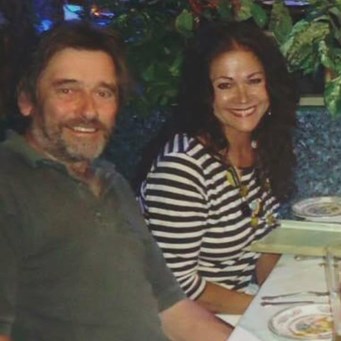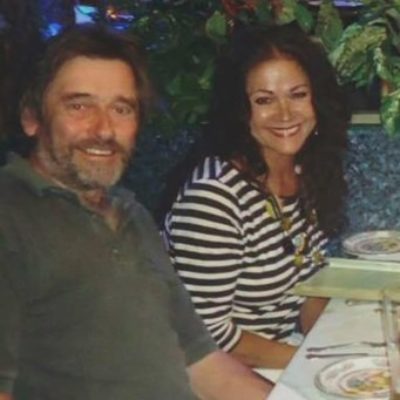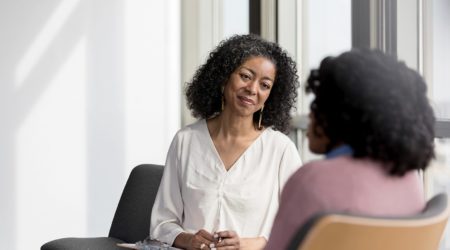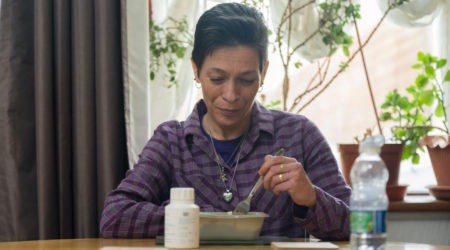



Jasmyn
Jasmyn shares her experience, as both her Mum and Dad were diagnosed with advanced pancreatic cancer in 2016.
Both of our parents were diagnosed with Stage 4 pancreatic cancer in 2016. Our mother, Debbie, was diagnosed at age 61 in August; our father, Michael, was diagnosed at age 63 in October. Dad seemed to find some pride in telling people what a statistical anomaly they were.
When my parents were diagnosed, my sister, Jessica, was 21, living at home and working at the London Dungeons. I was 23 and living in Canada, about to begin a Master’s degree in English at the University of Toronto. I shortly returned to England, and we rallied around one another as a family. To say the following months, which became years, were “difficult” is an understatement.
Mum and Dad’s treatment
Mum and Dad’s treatments were significantly different from one another due to their respective cancer’s metastasis: our mother’s cancer was in her pancreas and lungs; our father’s in his pancreas and liver. Because of where we lived, getting to and from appointments was awkward, too. Some appointments were in Maidstone; others were in London.
While undergoing chemotherapy treatment, Mum complained of feeling tired and lethargic and later noticed a constant tingling in her fingers, which never went away. Dad, on the other hand, was often violently sick and lost all of his hair within a few months. He asked my sister and me to shave his head on Easter morning in 2017. It wasn’t exactly how we both envisioned the day.
Lifestyle changes and managing side effects
It’s strange, the change in routine that comes from a cancer diagnosis. Everything seems to revolve around hospitals suddenly: appointments, treatments, medications, new treatments, new medications, scans, then more scans.
The lifestyle changes those hospital visits bring seem small at first, but become increasingly more significant: making dietary changes because some foods can no longer be eaten; turning down social invites due to feeling sick or weak; newfound mobility issues. Mum did not have a problem using mobility devices when she needed to, but Dad’s pride never allowed for that. He was still climbing stairs the week before his death; Mum knew she had to stay in the downstairs living room on oxygen.
As for changes in the dietary requirements, both of my parents were encouraged to have smaller meals more often and to avoid fatty or greasy foods. Both were given pancreatic enzymes (Creon) to aid digestion, but there was often confusion as to how many they were meant to take with each meal. They were also advised to drink Ensure (a nutritional supplement drink), which they grew to hate.
Additionally, they could no longer eat spicy foods (a blow for them both, as we enjoyed going out for the occasional curry). Mum found that she got a sweet tooth, and would often snack on sweeter things. As a result of their increasingly complex dietary needs, both our parents began turning down social invitations to barbecues and other events. Mum could barely eat normal-sized portions for a lot of her illness, as she said it caused too much discomfort, whereas Dad tried to eat normal-sized meals, but he would then often go to the toilet during or immediately afterwards. He never admitted to throwing up, but I am sure that was what was going on.
Towards the end, Mum lost her appetite entirely, and only ate ice lollies or crackers. As Dad’s cancer got worse and advanced beyond his pancreas and liver to his kidneys, his potassium levels went awry, so he was unable to eat a lot of fruit and vegetables, for fear it could drastically increase his potassium levels and cause heart problems. I think this depressed him, as he had always enjoyed eating (often large amounts!), and it seemed like there was nothing left that was “safe”. It was definitely one of the more difficult parts of the illness for them both, especially when it came to us trying to eat meals together as a family. It became a huge source of frustration and sadness.
Coming to terms with their diagnosis
Both of our parents put up an incredible fight in the face of their respective diagnoses. Yet, both reacted differently to their prognoses: while our mother bravely accepted that she would not make old age and even checked herself into the hospice when she knew she was close to the end, our father stubbornly denied that cancer would beat him. Dad continued to do physical labour as a builder for most of his illness and even had to be encouraged by a close family friend to go to the hospital the week before he died.
Two years after her diagnosis, Mum passed in the early summer of 2018. Three years after his diagnosis, in November 2019, Dad died. Their ashes rest at our family home in southeast England: a house my father built for us. The period between Mum’s death and Dad’s was horrendous. We were collectively grieving Mum, knowing that Dad would soon be gone, too. Dad found some relief in continuing to putter around the home, finding he had a bit of a green thumb. As he cultivated and breathed life into his garden, his body grew increasingly frail. His ashes lie under an apple tree we planted for him.
Not a day goes by when we don’t think about our parents
My sister and I found our parents’ diagnoses challenging: we had to support them during their illnesses, of course, but we also had to grapple with the impending loss of not one, but both of our parents. The last few years have proven incredibly trying. However, we are healing. We have both learned that grief is not something you “move on” from; it is something you carry with you. Not a day goes by when we don’t think about our parents.
Jess and I are both incredibly thankful that we were able to spend time together as a family in those bittersweet months before our parents passed away. Not everyone gets that after a cancer diagnosis. We are thankful to all of the healthcare practitioners who helped us along the way. And of course, we are grateful to our parents: thank you, Mum and Dad, for everything. Thank you for teaching us how to be resilient.
March 2020




